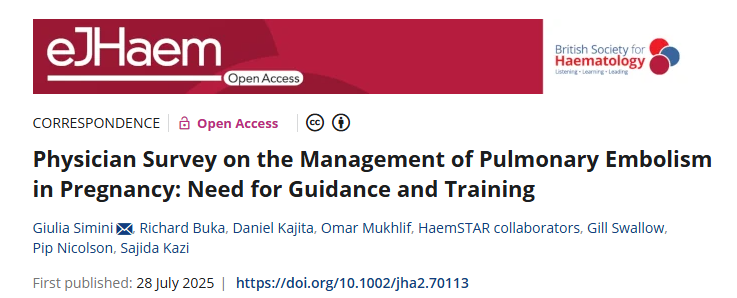
eJHaem Publication and MATRON Audit Spotlight Gaps in Pulmonary Embolism Care for Pregnant Patients
Giulia Simini, Haematology Resident at at University College London (UCL), has shared a post on Linkedin:
“New publication out in eJHaem:
‘Physician Survey on the Management of Pulmonary Embolism in Pregnancy: Need for Guidance and Training’
Our survey reveals significant challenges in managing pulmonary embolism (PE) during pregnancy —an area where uncertainty remains high. Key takeaways include:
- A pressing need for high-quality, real-world data on the management of intermediate- and high-risk PE in pregnancy
- Significant gaps in clinician training and limited access to advanced therapies
- Wide variability in clinical practice and perceptions of the usefulness of advanced interventions
- Uneven distribution and underutilization of Pulmonary Embolism Response Teams (PERTs)
In direct response to these findings, we launched MATRON – a national, multicenter audit focused on the management of high-risk and intermediate-high-risk PE in pregnancy.
By capturing real-world data across the UK, MATRON aims to fill critical evidence gaps and lay the groundwork for future clinical guidance. Results from first round of data collection will be shared soon.
A huge thank you to our collaborators and all the clinicians who contributed to this work.”
You can check the MATRON webpage here
Title: Physician Survey on the Management of Pulmonary Embolism in Pregnancy: Need for Guidance and Training
Authors: Giulia Simini, Richard Buka, Daniel Kajita, Omar Mukhlif, HaemSTAR collaborators, Gill Swallow, Pip Nicolson, Sajida Kazi

Read the full article here.
Stay informed with Hemostasis Today.
-
Feb 17, 2026, 09:04Mahesan Subramaniam: A Heart Attack Is a Long Story That Ends Fast
-
Feb 16, 2026, 15:44Lakmali Silva: Silva Lab Showcases Research at the Gordon Research Conference on Plasminogen and Extracellular Proteolysis
-
Feb 16, 2026, 15:36Heghine Khachatryan: Strengthening Maternal Resilience Against Postpartum Hemorrhage
-
Feb 16, 2026, 15:34Sevak Mirabyan: Advancing Cancer Care Through Knowledge, Collaboration, and Early Diagnosis in Armenia
-
Feb 16, 2026, 15:29Chokri Ben Lamine: Key Clinical Insights of Drug Induced Thrombocytopenia
-
Feb 16, 2026, 15:28Ney Carter Borges: Coronary Intravascular Lithotripsy – Clinical Performance and Safety
-
Feb 16, 2026, 15:24Flora Peyvandi: Highlighting Overdose, Homicide, and Suicide as Causes of Maternal Death in the US
-
Feb 16, 2026, 14:53Wafaa Abougabal: Differential Diagnosis of Acute Neurologic Deficits and Stroke in PICU
-
Feb 16, 2026, 14:49Nayab Ahmed: Synthesis of ATP and Its Significance in Storage of Blood

